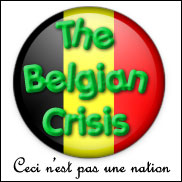The Unlikely Rebels from Across the Street
From the desk of The Brussels Journal on Fri, 2007-09-21 19:09
 A quote from The Washington Post, 21 September 2007
A quote from The Washington Post, 21 September 2007
In the back room of [De Warande] an exclusive social club across the street from the U.S. Embassy here, Flemish separatists are plotting the breakup of Belgium. In their tailored suits and silk ties, they appear unlikely rebels. […] The campaign here is a modern-day separatist movement for a globalized world. This is not a war of guns and guerrillas in jungle hideouts or suicide bombings on city streets. It is a conflict debated daily in the news media, parliaments, cafes, bars and establishment clubs of a country confronting the schisms now facing nearly every European nation: the struggle over national identity following mass immigration from Asia and Africa, the preservation of native culture and language, and economic competition in an era of global markets.
[…] Some Belgians warn that talk of secession coming from the E.U.'s power center sends a dangerous message to the rest of the world. “We live in the 21st century, with globalization and international migrations,” said Joelle Milquet, president of the French-speaking Humanist Democratic Center party and one of the most influential opponents of greater autonomy or independence for Flanders. “If at the heart of Europe, with 10 million inhabitants, we are not able to have common views, how can we manage other countries?” […]
[Remi] Vermeiren, the former bank president, is the lead author of the 252-page “Manifesto for an Independent Flanders Within Europe,” and he and his fellow revolutionaries have been meeting for several years in a De Warande club back room. Vermeiren believes the breakup of Belgium, though not imminent, is inevitable and discusses it as matter-of-factly as he might the sale of an unprofitable corporation. […] Vermeiren, like many Flemings, said he is tired of having his taxes and his region's revenue going to support economically backward Wallonia. By just about every economic measure he has studied, from income taxes to traffic fines, Flanders generates more revenue than Wallonia. The Walloons, he said, siphon off far more than their fair share of national funds.
The Flemings are demanding more autonomy over their budget and governance. The Walloons, anxious about being on the losing end, refuse to give in. And what if Belgium does cease to exist as a country? [Frank] Vanhecke, the Flemish Interest party leader, shrugged and said he doesn’t believe the world will miss it. “Who cares?” he said.

In Response to the "Unlikely Rebels"
Submitted by Kapitein Andre on Sun, 2007-09-23 03:30.
the Post: The campaign here is a modern-day separatist movement for a globalized world.
Not exactly. Although regional economic issues - transfer payments in particular - may be the catalyst for an independent Flanders, the underlying issues here are ethnic and cultural. The Flemings tend to identify with Germanic civilisation, as expressed linguistically, and the Walloons with French or Gallo-Roman civilisation. Despite the settlement of Germanic tribes in France, in particular the Franks, Burgundians and Alemanni, and their assumption of power and role in establishing Francia as a successor state to the defunct Western Roman Empire, these were ultimately assimilated at least culturally. Like Luxembourg, parts of Switzerland and Alsace-Lorraine, Belgium is on the relatively wide and blurred boundary between these two civilisations. So no, this separatism has little to do with modernity or globalization but has been in the works for over 1500 years.
A "modern-day separatist movement for a globalized world" would be the regionalism that occurred throughout Canada during the 1980s and 1990s, and the idea of "Cascadia".
the Post: This is not a war of guns and guerrillas in jungle hideouts or suicide bombings on city streets. It is a conflict debated daily in the news media, parliaments, cafes, bars and establishment clubs of a country...
Unlike in the former Yugoslav state, the Flemings and Walloons already have a relatively firm grip on their territories, populations, resources and wealth; moreover, structures will emerge immediately to administer these should the Belgian state collapse.
the Post: the schisms now facing nearly every European nation: the struggle over national identity following mass immigration from Asia and Africa, the preservation of native culture and language, and economic competition in an era of global markets.
Economic competitiveness is one thing, 'peaceful' colonization from without is quite another. So long as Flanders gives up Brussels, it will be fairly homogenous.
the Post: Some Belgians warn that talk of secession coming from the E.U.'s power center sends a dangerous message to the rest of the world. “We live in the 21st century, with globalization and international migrations,” said Joelle Milquet...“If at the heart of Europe, with 10 million inhabitants, we are not able to have common views, how can we manage other countries?”
I was unaware that nations existed to be "managed".
De Warande
Submitted by traveller on Sat, 2007-09-22 11:19.
The article should mention who exactly Remi Vermeiren and his friends of the Warande are. It would give more impact to the article.